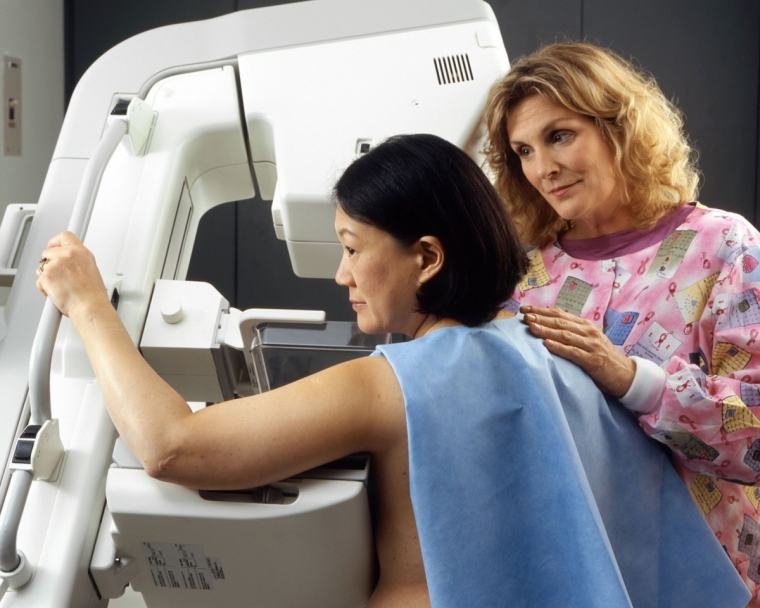Cancer News Update 2015: Mammography Presents 'Small Benefit' Yet 'Some Risk' For Women

An anti-cancer group in the U.S. acknowledged that "there is some small benefit but there is also some risk" for women undergoing mammography to find out if they have breast cancer.
Nevertheless, the U.S. Preventative Services Task Force advised women between 40 and 49 years of age to get themselves screened for breast cancer through mammography after considering the risks and benefits of the procedure.
"Younger women should work with their doctors to balance the pros and cons of mammography and make a determination that best fits their situation and values," said Dr. Michael LeFevre, the outgoing chairman of the task force.
"There is some small benefit but there is also some risk," LeFevre told ABC News.
"The group's top level recommendations that women should begin mammogram testing at age 50 and only schedule them every two years until about age 74 have not changed," he clarified. "We've also said in the past that the decision to start screening mammography in women prior to age 50 years should be an individual one," he noted.
The recommendation follows studies showing that breast cancer deaths decrease by 16.5 percent over a lifetime if women are given mammograms every other year from ages 50 to 69.
Meanwhile, a 19.5 percent lifetime reduction in deaths from breast cancer is seen if such test starts at age 40 and continues every other year. The three percent-difference roughly translates to saving one woman's life for every 1,000 who are screened, health authorities said.
However, screening younger women also results in a higher number of false positive tests and unnecessary procedures, the ABC News report said.
About half of the women who undergo a decade of annual mammograms will be told that their tests are positive even when they actually do not have cancer, according to a study by the University of California at San Francisco.
While those who receive the false-positive news will undergo more testing, one in a dozen of them will take invasive biopsy surgery with the risk of complication from anesthesia, scarring and infection, the study said.
Getting the screening recommendations is crucial as the number of women diagnosed with breast cancer is seen to increase significantly in the coming years, according to another new study by the National Cancer Institute.
"The number of cases will be 50 percent higher in 2030 than they were in 2011," said Dr. Philip Rosenberg, one of the study's lead authors.
The increase to around 440,000 cases of breast cancer per year in the U.S. from 283,000 will be boosted by a larger and older population and an increased rate of certain types of cancers, including some that have a greater chance of being picked up on mammography, said Rosenberg.
"We hope this information will be used by the experts in treatment so they can chart a better course in the coming years," he said.
 Christians don't have to affirm transgenderism, but they can’t express that view at work: tribunal
Christians don't have to affirm transgenderism, but they can’t express that view at work: tribunal Archaeology discovery: Medieval Christian prayer beads found on Holy Island
Archaeology discovery: Medieval Christian prayer beads found on Holy Island Presbyterian Church in America votes to leave National Association of Evangelicals
Presbyterian Church in America votes to leave National Association of Evangelicals Over 50 killed in 'vile and satanic' attack at Nigerian church on Pentecost Sunday
Over 50 killed in 'vile and satanic' attack at Nigerian church on Pentecost Sunday Ukrainian Orthodox Church severs ties with Moscow over Patriarch Kirill's support for Putin's war
Ukrainian Orthodox Church severs ties with Moscow over Patriarch Kirill's support for Putin's war Islamic State kills 20 Nigerian Christians as revenge for US airstrike
Islamic State kills 20 Nigerian Christians as revenge for US airstrike Man who served 33 years in prison for murder leads inmates to Christ
Man who served 33 years in prison for murder leads inmates to Christ


 Nigerian student beaten to death, body burned over ‘blasphemous’ WhatsApp message
Nigerian student beaten to death, body burned over ‘blasphemous’ WhatsApp message 'A new low': World reacts after Hong Kong arrests 90-year-old Cardinal Joseph Zen
'A new low': World reacts after Hong Kong arrests 90-year-old Cardinal Joseph Zen Iran sentences Christian man to 10 years in prison for hosting house church worship gathering
Iran sentences Christian man to 10 years in prison for hosting house church worship gathering French Guyana: Pastor shot dead, church set on fire after meeting delegation of Evangelicals
French Guyana: Pastor shot dead, church set on fire after meeting delegation of Evangelicals ‘Talking Jesus’ report finds only 6% of UK adults identify as practicing Christians
‘Talking Jesus’ report finds only 6% of UK adults identify as practicing Christians Mission Eurasia ministry center blown up in Ukraine, hundreds of Bibles destroyed: 'God will provide'
Mission Eurasia ministry center blown up in Ukraine, hundreds of Bibles destroyed: 'God will provide' Church holds service for first time after ISIS desecrated it 8 years ago
Church holds service for first time after ISIS desecrated it 8 years ago Burger King apologizes for 'offensive campaign' using Jesus' words at the Last Supper
Burger King apologizes for 'offensive campaign' using Jesus' words at the Last Supper Uganda: Muslims abduct teacher, burn him inside mosque for praying in Christ’s name
Uganda: Muslims abduct teacher, burn him inside mosque for praying in Christ’s name